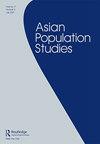返乡与不返乡:中国城市农民工返乡意愿的决定因素研究
IF 1.5
4区 社会学
Q2 DEMOGRAPHY
引用次数: 9
摘要
摘要长期以来,发达城市一直是中国农民工青睐的目的地。然而,近年来,中国返乡移民的发生率有所上升,对原籍国和目的地的经济发展和社会治理都产生了重大影响。由于可获得的数据有限,国家一级移徙工人的返回意愿基本上没有得到探索。本研究利用2016年中国农民工动态调查(CMDS)的数据,调查了居住在目的地城市的农民工的返乡意愿。计量经济学数据分析表明,家庭关系(即家庭成员住在一起,以及是否带着孩子迁移)和住房因素(即住房所有权、住房支出比例、住房保有权和集体生活)对返回意愿有显著影响,社会和空间因素(即行业类型、就业状况、保险范围、移民距离和停留时间)也发挥着重要作用。我们的研究结果也指出了地理位置对返回意愿的影响。研究报告最后提出了关于制定人口管理政策的建议。本文章由计算机程序翻译,如有差异,请以英文原文为准。
Return or not return: examining the determinants of return intentions among migrant workers in Chinese cities
ABSTRACT Well-developed cities have long featured as favoured destinations for Chinese migrant workers. In recent years, however, the incidence of return migration has increased in China, with a significant impact on economic development and social governance at both the origins and destinations. Owing to the limited availability of data, the return intentions of migrant workers at the national level have gone largely unexplored. Using data from the 2016 China Migrant Dynamic Survey (CMDS), the study investigates the return intentions of migrant workers residing in destination cities. Econometric data analysis indicates that family connections (i.e. family members living together, and whether to migrate with children) and housing factors (i.e. housing ownership, housing expenditure proportion, housing tenure, and group living) have significant effects on return intentions and that social and spatial factors (i.e. type of industry, employment status, insurance coverage, migration distance, and duration of stay) also play significant roles. Our results point as well to the influence of geographical location on return intentions. The study concludes with recommendations regarding the formulation of population management policies.
求助全文
通过发布文献求助,成功后即可免费获取论文全文。
去求助
来源期刊

Asian Population Studies
DEMOGRAPHY-
CiteScore
3.30
自引率
14.30%
发文量
12
期刊介绍:
The first international population journal to focus exclusively on population issues in Asia, Asian Population Studies publishes original research on matters related to population in this large, complex and rapidly changing region, and welcomes substantive empirical analyses, theoretical works, applied research, and contributions to methodology.
 求助内容:
求助内容: 应助结果提醒方式:
应助结果提醒方式:


